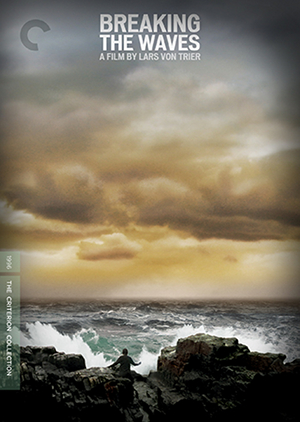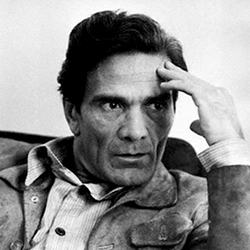
Breaking the Waves Review - NP Approved
Breaking the Waves (1996)
Cast: Emily Watson, Stellan Skarsgård, Katrin Cartlidge
Director: Lars von Trier
Country: Denmark | Sweden | France | Netherlands | Norway | Iceland | Spain
Genre: Drama | Romance
Official Site: Here
Editor’s Notes: Breaking the Waves is now available on dual-format Blu-ray/DVD from the Criterion Collection.
Before gifting us the cinema of blood spurting phalluses (and talking foxes!) in 2009, before he ended the world in 2011, and before he, in graphic yet clinical fashion, challenged the sexual mores of society and the filmic facsimiles thereof this past year, Lars von Trier made Breaking the Waves, a work that’s as much a remonstration as is its younger brethren. Despite the late public courts decreeing him more a provocateur than auteur – even a hybrid moniker like “provocauteur” feels like a concession of his talents – the confrontational tenor that pervades his films is one that’s distinctly personal, an extension of his own musings on social and artistic orders, his own phobias and anxieties, and his own feelings on what constitutes beauty and amity; his characters often reflect this, bearing the weight of the director’s cognitive crosses as they march themselves perforce toward martyrdom. What’s of important note, however, is that while von Trier readily projects his own traits and concerns unto a protagonist, he’s able to refrain from painting himself a sacrificial lamb – he never truly characterizes by way of surrogacy. Thus, his films take the form of largely candid but wholly exotic outlets, works that are imbued with a certain intimacy even when at their most oblique or didactic; to find appeal in von Trier’s cinema is to realize that his essayist intellectualism and his coarse humanity are complimentary tendencies of the same persona.
…to find appeal in von Trier’s cinema is to realize that his essayist intellectualism and his coarse humanity are complimentary tendencies of the same persona.
Breaking the Waves may very well be the director’s most harmonious integration of his sensibilities empathic and phrenic. Set in an isolated, spiritually dependent Highland village, the story is one that finds insight in dichotomy, even between the lushly free-growing environ and the measured behavior of its human inhabitants. As native Bess McNeill (Emily Watson) is set to marry Jan (Stellan Skarsgård) – an outsider who is delivered to her via helicopter from what we’ll generously call “the heavens” – the attitudes of her area’s dogmatic denizens juxtaposed against his own colorful cohorts’ feel almost comically polarized. These early scenes, which document the rhythms of ceremony and ceremonial discomfort alike, provide us with something more than mere exposition: they infuse the proceedings with ambiguity. Questions arise of and allusions are made to the nature, temporally speaking, of the couple’s courtship. And while it appears that the two genuinely love each other, they clearly process the concept of love in different, if not ostensibly combative, ways. Bess, a product of her sectarian upbringing, associates the emotion with the graces of her personal god, even to the point that she whispers “thank you” to the skies shortly after sexual cessation. Conversely, Jan is portrayed as more carnally motivated, though I argue that, in this instance, von Trier is less interested criticizing men than contrasting what Jan and Bess feel constitutes normalcy. After observing the reserved, ritualistic behavior of her community, the bridegroom’s physical appetites read as amicably human by comparison. Moreover, as copulation comes to dominate our access of the couple’s relationship throughout the first two chapters of the film, it’s likely that we too are meant to question the veracity of their feelings for each other, and the very integrity of their union.
 The underlying theme of many of the film’s elements, aforementioned and otherwise, then, is to affront convention, whether it stems from archaic, patriarchal belief systems, presupposed rules of sex and conjugality, or even highly regarded artistic traditions. (That religious tenets are given equal footing with medical reasoning, however, is one of the work’s weaker assertions.) As the dynamic of the central couple changes throughout the film, Breaking the Waves comes to dissect and censure airs of judgment and perspectivist entitlement – of knowing what’s right for others – from all of these angles. It loudly broadcasts the way power structures are maintained within religious communities (women aren’t able to speak at Bess’s church or attend funerals, for instance), but then fairly demonstrates the feelings of stability and security that participants of such groups often claim. Equally important is the treatment of Bess by her family and local hospital staff, as they attempt to put a logical, Earthly spin on the unconfined connection shared by she and Jan. The former group scolds that she’s “Clinging to the world rather than fleeing from it,” and the latter warns that “If you can’t control your moods, it’ll be the hospital again for you”. These widely accepted worldly lenses, coupled with the audience’s own biases, are meant to delicately marginalize the feelings of Bess and Jan, feelings which are forced to exist in a world of preformed constraints and prejudice.
The underlying theme of many of the film’s elements, aforementioned and otherwise, then, is to affront convention, whether it stems from archaic, patriarchal belief systems, presupposed rules of sex and conjugality, or even highly regarded artistic traditions. (That religious tenets are given equal footing with medical reasoning, however, is one of the work’s weaker assertions.) As the dynamic of the central couple changes throughout the film, Breaking the Waves comes to dissect and censure airs of judgment and perspectivist entitlement – of knowing what’s right for others – from all of these angles. It loudly broadcasts the way power structures are maintained within religious communities (women aren’t able to speak at Bess’s church or attend funerals, for instance), but then fairly demonstrates the feelings of stability and security that participants of such groups often claim. Equally important is the treatment of Bess by her family and local hospital staff, as they attempt to put a logical, Earthly spin on the unconfined connection shared by she and Jan. The former group scolds that she’s “Clinging to the world rather than fleeing from it,” and the latter warns that “If you can’t control your moods, it’ll be the hospital again for you”. These widely accepted worldly lenses, coupled with the audience’s own biases, are meant to delicately marginalize the feelings of Bess and Jan, feelings which are forced to exist in a world of preformed constraints and prejudice.
What I feel makes Breaking the Waves more appealing to a larger collective than, say, a Dogville or an Antichrist, is its trenchant pleas for warmth and lenity.
Despite being nearly two decades old, it becomes difficult to expound upon Breaking the Waves in footloose fashion without divulging too much in way of spoilers. But with that said, there’s an event that occurs roughly one third of the way through the film that disrupts both its tone and the relationship at its heart, and Von Trier uses the ripples of this pivotal plot point as a way to further leverage social pressures onto the lives of Bess and Jan. “Nothing else matters,” opines Bess while praying that god will bring her husband home from his work away. With this definitive statement, it’s shown that the reputedly fragile naiveté has come to know a way of looking at life – through the veil of romantic love – that’s greater than the pressures of her imperious local church. Humans, von Trier understands, are creatures always in search of explanation. This is why Skarsgård’s Seligman in Nymphomaniac constantly correlates occurrences with scientific or artistic precedents, and why Charlotte Gainsbourg’s character in Antichrist interprets parallels between human society and the animal kingdom as sentimental, even personal; we want to think our actions are meaningful and extend beyond our immediate periphery. Bess too assigns divine importance to that which befalls her and Jan, because she’s been taught to do so, sure, but also because she believes it in a deep, intuitive sense; whether the latter reason is merely a symptom of the former is a matter the director wisely keeps his distance from. Instead, he contends that fixating on and furthering our own perspective on life, regardless of our certainty, only deepens the interpersonal chasms we encounter.
What I feel makes Breaking the Waves more appealing to a larger collective than, say, a Dogville or an Antichrist, is its trenchant pleas for warmth and lenity. Just as it examines the various devices we use to explain and categorize our world (religion, class, science, family, and so on), it goes one step further to detail how the individual processes stimuli corporeally – how our entire being is dependent on bodily sensation and how our physical and mental faculties are codependent of each other. It’s concerns such as this, von Trier posits, that should ballast our moral decisions; otherwise we’re merely propagating the same preordained ethical binaries of right vs. wrong. As if propping up the wisdom of Grace Hopper, the work’s running mantra seems to be the spin on her aphorism: “The most dangerous phrase in the language is, ‘We’ve always done it this way.’” Hence, Lars’s insistently eccentric approaches to issues both human and formal, as, without their presence, cinema and humanity alike would be a lot more flaccid.
Transfer
Much has already been made regarding the color palette of this 4k transfer from Criterion taking on an Earthier, sepia-dipped feel, but the actual difference, while in gorgeous, granularly fluid motion, seems less substantial. Owners of previous DVD editions may need some time to adjust to such a sudden chromatic shift, but the resulting image is easy to adapt to, particularly given the enormous amount of information and texture present in each frame. Given the picture’s age, some inconsistencies appear during darker sequences, making the image feel heavier and prentice; no bother, the overseers of the release thought better of doing anything in way of digital tinkering, and the compositions organically settle and correct with time. Those familiar with the film can probably foresee that the static intertitle sequences are the transfer’s visual and aural nonpareils (they are), but it’d be wrong to trivialize the sensorial power of the film’s other sequences. In a moment while Bess waits for Jan’s helicopter to take off, the climbing whirl of its motor matches the crescendoing anxiety that’s written on her face. The high-def experience of this scene is an absorbing, sensational apex within a film that already lauds the value of physical stimulation. C’est magnifique!
Extras
His films may feel editorially scattershot, but the superb set of supplements accompanying this Breaking the Waves disc set assures the von Trier apologist in us all that the director knows not the meaning of the word “arbitrary”. Criterion included the same selective scene commentary that was previously tethered to Sandrew Metronome’s DVD release, wherein his meticulous and exacting nature is given thorough delineation. More to the point, we learn that, even as his films are narratively adrift with myriad sociological and psychological reveries, he still cares deeply about their ability to cultivate an emotional response in his viewers. Adjoining featurettes are a smidge less substantial, but nonetheless allow for actors to comment upon the process of working with von Trier, making his dubious reputation seem unjustified. I’ve never taken much interest in deleted scenes, but about ten minutes of additional material is available for those who do. Above all else, the director’s immense sincerity and sense of humor can be gleaned from the goulash of subsidiary info, which makes his works, even at their most outwardly edifying, all the more personal and enjoyable.






















